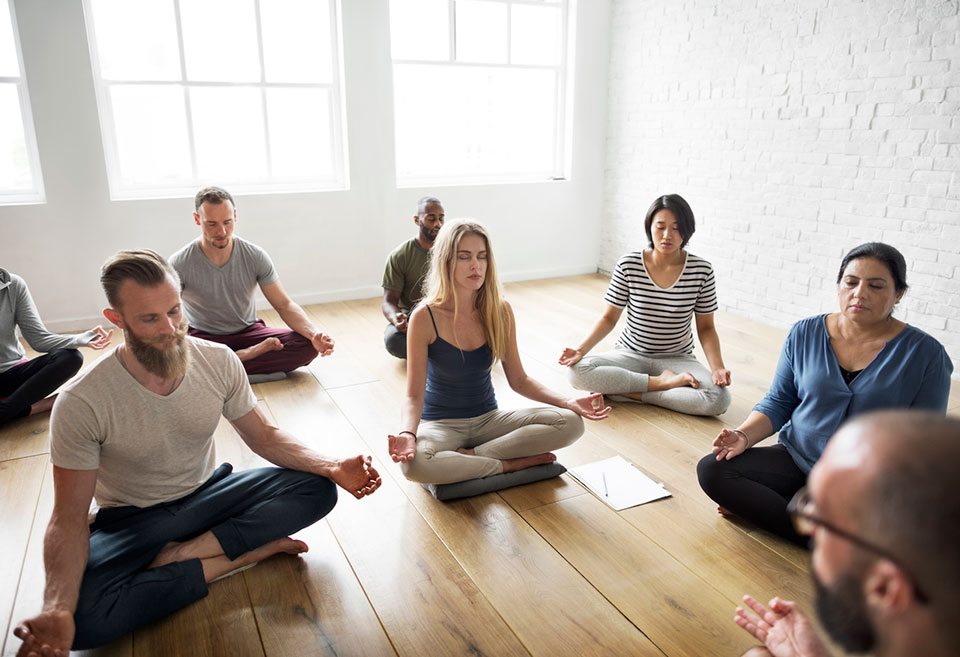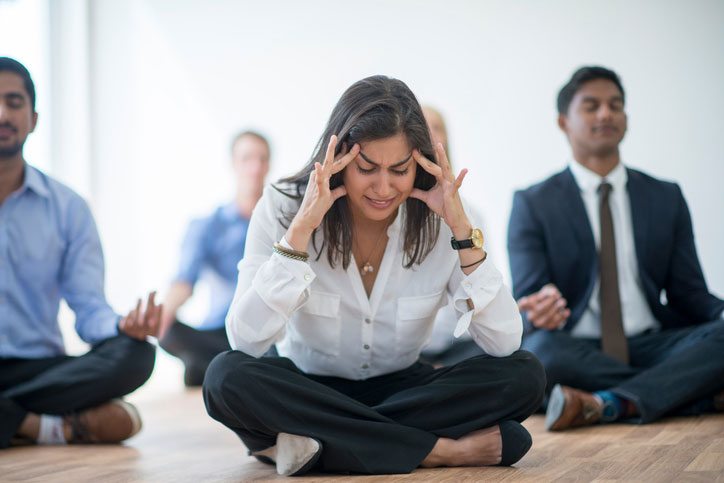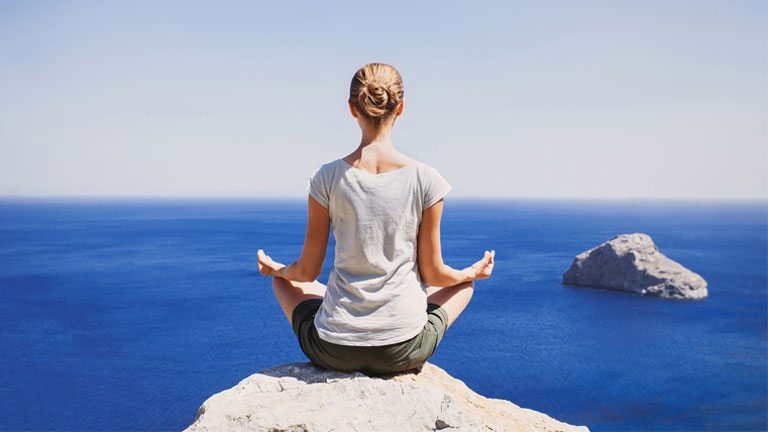Meditation is touted as good for everything from chronic pain to depression? But a growing number of experts believe it could be harmful. Parisa Hashempour investigates the dark side of zen
Sitting crossed legged on the bed, I try desperately to empty my mind of all distractions and pay attention to my breath. I twitch, fiddle a little until I slowly peel open my eyes and have a sneaky peek at my boyfriend sat next to me. He looks the epitome of calm. His brain is somewhere else entirely but I just can’t seem to relax. I don’t find meditation fun – there, I’ve said it. But with the wellness sect championing meditation as a life-changing experience that will allow me to de-stress, become more insightful and perhaps even a better person, I’m left feeling seriously guilty for not being able to get on board the super-trend. Not to mention more stressed for not being able to reduce said stress with a simple 20 minutes plugged into a mindfulness app.
for some people meditation can actually create anxiety
It seems as though every blogger, baker and builder is practising meditation right now. Madonna, Katy Perry and Hugh Jackman are all famously fans of the practice, New York’s latest wellness trend is ‘orgasmic meditation’ (yes, that’s actually a thing) and brand new research from the American Heart Association suggests that meditation may even decrease the risk of heart disease.

And yet, tricklings of a change in mood are starting to drip into the ether. New conversations are taking place among academics who say that meditation and mindfulness might not be the Holy Grail of health it’s been made out to be. As a failed meditator myself, I wanted to learn more so I embarked on a quest to find out about the negative side effects that never seem to get a mention, mindful or otherwise.
What is meditation, anyway?
According to The Buddhist Centre, meditation is a way to transform your mind and ‘develop concentration, clarity, emotional positivity and a calm seeing of the true nature of things.’ When you meditate you become more aware of your thoughts and feelings and this, in turn, is supposed to have a positive effect on your wellbeing. This sounds lovely (if a bit wishy-washy) and it’s easy to see how monks and millennials alike are getting behind the trend in equal measures.
And while it’s trendy right now, this practice is nothing new. I had a chat with 70-year-old Swami Ambikananda, a Hindu monastic yoga and meditation teacher (she mediates for three to four hours a day). ‘When I first started out my children were teenagers and they were embarrassed that they had a mother that meditated. I went from being a kook to being the coolest person in the room in almost no time at all. ‘While she was big on meditation before it was cool she’s quick to point out that it’s really not a trend at all. ‘It’s not a fad. It’s been around in many spiritual disciplines for centuries,’ she explained. And while meditations differ in style, according to experts at the University of Oslo pretty much all religions practice one form of meditation or another.
Why do people love it so much?
So why the recent growth in popularity? The reason I agreed to give it a go was on the back of the promise it would help with my anxiety. Over the past thirty years, hundreds of studies have emerged linking meditation and mindfulness to decreased levels of anxiety, depression and even feelings of pain. Dr Miguel Farias is a specialist in cognitive and biological psychology at Coventry University and his work over the years has focused on meditation, spirituality and mindfulness. ‘People have an understanding that by sitting down and focusing on something, whether it’s a mantra or your stream of thoughts, it can lead to some deep changes in yourself and will make a difference for the whole of society,’ he explained.
For some, such as Swami Ambikananda the practice can be part of a deep religious journey. ‘I just love that expression ‘shit happens’. Shit happens to all of us and that’s the nature of life – meditation helps me to keep all of it in perspective. But I didn’t go into it with the expectation that it would do that for me. It’s part of my spiritual quest and it’s something more than anything else in this world. It allows me to enter into a consciousness where that ‘something more’ can be examined.’ But meditation doesn’t work this way for everyone, says the Swami, ‘most people aren’t doing meditation nowadays for any spiritual benefit. They’re doing it for health and wellbeing.’

Meditation moved into the mainstream in the 1970s when more and more academic papers started to give it scientific backing. With the approval of science, the practice slowly became more popular. For a new generation of Westerners that were shaking off the religiosity of their parents and yet still craved spirituality in some form, meditation was the perfect antidote. ‘Religions don’t have the same sense of trust and authority that they used to. Now, science has that legitimacy. Meditation clearly has spiritual roots but it also has the approval of science,’ explained Dr Farias,’This is especially relevant for many people nowadays that are in a state of spiritual homelessness. We’ve eroded the structures of spiritual meaning and we’re looking for something else.’
And Swami Ambikananda believes there’s another reason we’ve become so attached to the practice. ‘ I think it comes from our innate need to flock, to do what others are doing and to be with others.’
The dangers of meditation
Our need for community is a good thing but it can also come with a dark side, concedes Swami Ambikananda. ‘If it’s useful for your anxiety great, do it. But let’s not ignore the fact that for some people it can actually create anxiety. Let’s not pretend we have the absolute research on this and stop saying that it is good for everybody.’
Indeed, Recent meta-analysis studies on meditation have found that meditation carries a risk of harmful side effects and Dr Farias warns that the general public needs to be more aware of some of the more negative side effects that mindfulness and meditation can have.’It can produce adverse effects for some people. We don’t currently know exactly why they happen or the prevalence of these problems but we have just started to understand that the negative side effects don’t just impact people who have mental health problems.’ Of all the people that the psychology specialist studies, very few had mental health problems prior to meditating. So what exactly are these difficulties? ‘They vary considerably. From increased anxiety and panic attacks to severe psychotic episodes lasting three days.’ How could something that has been hailed as an omnipotent health cure have the potential to be so damaging?
she went to a meditation retreat and had a serious psychotic episode that turned into severe depression
Ambikananda recalled the story of one woman that learned too late the devastating effects that meditation can have, ‘One woman came to me and she had gone for ten days to a silent retreat. After day three or four she suffered from what psychologists would call dissociation. She spoke to one of the senior people at the retreat and explained her feelings and their answer was to tell her to just keep meditating and work her way through it.’ Dissociation is a process where you disconnect from your thoughts, feelings, memory and sense of identity and this particular woman ended up in psychotherapy for years after. Dr Farias relayed the story of another woman that had a bad experience, ‘I met someone that used to be a meditation and yoga teacher and after doing it for two decades, she went to a meditation retreat and had a serious psychotic episode that turned into severe depression and it took two decades to come out the other side.’ And the problem that recurs in most of these situations is that because teachers are often unaware of the adverse effects they often place the blame on the person meditating, telling them that they mustn’t be doing it right, rather than looking at the meditation itself.

And that’s not all. Although meditation has been hailed as a cure for conditions like anxiety and depression, Dr Farias advises pursuing this method of treatment with caution. ‘Right now, the only thing that mindfulness and meditation are recommended for is people that have recurrent depression. There really isn’t any clear benefit in doing it if you’ve been depressed just once and in fact, it’s often counterintuitive if you are depressed. Meditation reduces your level of activity and when you’re depressed you already tend to be much more low in energy and withdrawn so usually you’re advised to do things which are associated with physical exercise and activity. Meditation may allow you to ruminate on your thoughts more.’
And Ambikananda agrees. When she was in her 20s, the Swami became pregnant with twins. After the birth, she fell into a pit of depression. ‘Nobody spoke about post-natal depression then, it just wasn’t on anyone’s horizon. I went into a terribly black depression and at that time I encountered a Hindu monk. He understood I was depressed and didn’t try to teach me meditation, thank God. It was after I’d known him for three or four years that he said I was ready to learn. I was suicidally depressed and I do feel that at the time meditation would have taken me over the edge.’
But surely meditation is a force for good?
Shocked about my findings, I explained to Dr Farias that I’d often heard people saying that in their ideal world everyone would meditate. And while I struggled to do it myself, I could certainly see the appeal of an inward-looking, calmer world filled with meditators. ‘We seem to have a cultural intuition that if every child in the world were to meditate then violence in the world would end within one generation,’ said Dr Farias, ‘when actually there are so many routes to aggression and violence including poverty and social inequality – it’s really very ridiculous to say something like that.’

And Ambikananda takes this one step further. ‘In the early 1930s, the Japanese army recruited young men in their teens and trained them in the airforce. They were teaching them mindfulness meditation and these teenagers were to become kamikaze pilots. They would eventually use this mindfulness when they crashed their planes into ships in an act of suicide.’ Ambikananda is concerned about the use of meditation on children and in schools. She believes techniques like this are being used as cowboy fixes to more serious societal problems such as increasing reports of depression in children. ‘It’s so easy to give kids mindfulness classes and tick a box that says we’ve done something, nevermind whether it works or not,’ worried that we’re either turning children into zombies or creating more problems she said ‘meditation is like sex, it’s an adult decision.’
Why do these negative side effects happen?
It turns out, a lot of the time we’re not really entirely sure why these adverse effects happen but there are some theories. ‘An article published by Brown University earlier this year determined that it might have something to do with the way you interpret your experience. For example, when you’re touched by your romantic partner, it feels pleasant. But if someone you don’t know tries to touch you in the same way you find it repugnant or you’re scared, even though the touch itself is exactly the same – there’s an appraisal process going on. If you get into a deep, altered state of consciousness when you’re meditating you tend to attribute that to either a positive or negative effect. If someone is experiencing the dissolution of the self it can feel very liberating and blissful but others will see this as the breaking down of who they are.’
being with yourself means being with every demon you have
To Ambikananda, it’s obvious that people meditating without proper guidance might run into difficulties. ‘When you sit down for meditation you are immediately with yourself. And being with yourself means being with every demon you have. And all of us have them. The idea that we should just sit down and put a 20 minute mindfulness app on is actually just dangerous and the people selling them aren’t honest – meditation is designed to provoke those demons.’
But it’s not all bad
Although he studies the adverse effects, Dr Farias admits that when it comes to meditation, it’s definitely not all bad. ‘I find it a really interesting and pleasant experience – I wish I had more time for it sometimes. It’s therapeutic. I like to just let go of everything and be quiet for a moment. And there are times it has a spiritual or religious purpose for me but I still think if you want to do self-exploration and understand deeply ingrained emotional patterns, you need to get yourself a really good psychotherapist.’
Swami Ambikananda adds that while it can bring benefits, nobody should feel pressured into meditating. ‘I love meditation. I love the experiences I have when I meditate and I’m sorry that people feel coerced into it. I’m sorry that some people try it without learning from someone experienced and are left feeling a lot worse about themselves. But if meditation helps you then do it. The world has become crushingly difficult so embrace whatever you can to help get you through.’ And if it doesn’t? No worries, says the Swami, ‘to be honest, 20 minutes of gardening will do you a whole lot more good.’
Read more
How meditation changes your brain
The different types of meditation
9 ways to work mindfulness into your day
13 mindfulness exercises you can do right now
Like this article? Sign up to our newsletter to get more articles like this delivered straight to your inbox.





















































